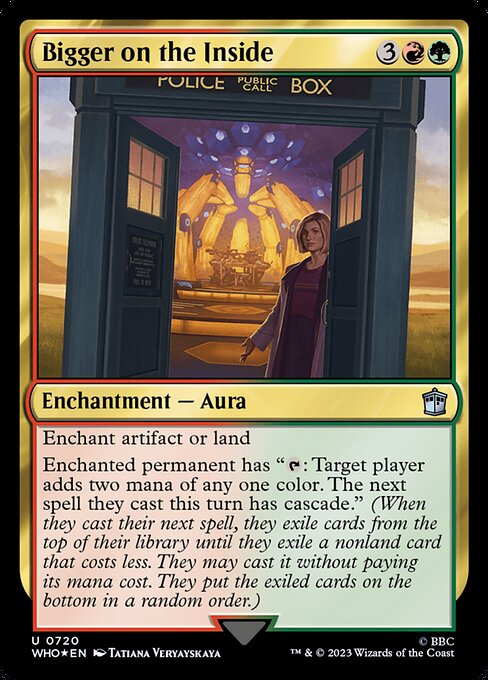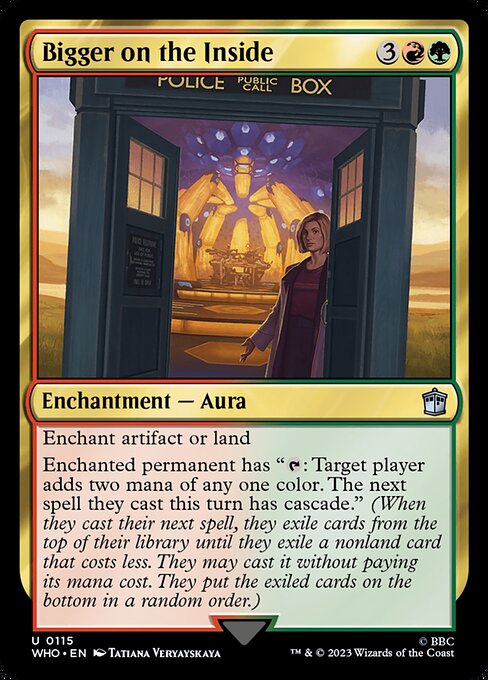Bigger on the Inside
Enchantment — Aura
Enchant artifact or land
Enchanted permanent has ": Target player adds two mana of any one color. The next spell they cast this turn has cascade." (When they cast their next spell, they exile cards from the top of their library until they exile a nonland card that costs less. They may cast it without paying its mana cost. They put the exiled cards on the bottom in a random order.)
Enchanted permanent has ": Target player adds two mana of any one color. The next spell they cast this turn has cascade." (When they cast their next spell, they exile cards from the top of their library until they exile a nonland card that costs less. They may cast it without paying its mana cost. They put the exiled cards on the bottom in a random order.)
standard
future
historic
gladiator
pioneer
explorer
modern
legacy
pauper
vintage
penny
commander
brawl
alchemy
paupercommander
duel
oldschool
premodern
Rulings
When the cascade ability resolves, you must exile cards. The only optional part of the ability is whether or not you cast the last card exiled.
If a spell with cascade is countered, the cascade ability will still resolve normally.
The mana value of a split card is determined by the combined mana cost of its two halves. If cascade allows you to cast a split card, you may cast either half but not both halves (unless the card has fuse).
A spell's mana value is determined only by its mana cost. Ignore any alternative costs, additional costs, cost increases, or cost reductions.
If a spell has multiple instances of cascade, each one triggers separately.
You exile the cards face up. All players will be able to see them.
Cascade triggers when you cast the spell, meaning that it resolves before that spell. If you end up casting the exiled card, it will go on the stack above the spell with cascade.
As the activated ability resolves, it creates a continuous effect that won't begin to apply until the targeted player starts casting a spell this turn. It applies to that spell and the timestamp of that effect is the time that the spell was put on the stack.
Some cards, such as modal double-faced cards or adventurer cards, can be cast as one of two different spells, each with different mana costs. If the card you're casting as the cascade ability resolves is one of those cards, you may choose to cast it as either of those spells that has a lower mana value than the spell with cascade.
If the card has in its mana cost, you must choose 0 as the value of X when casting it without paying its mana cost.
If you cast a card "without paying its mana cost," you can't choose to cast it for any alternative costs. You can, however, pay additional costs. If the card has any mandatory additional costs, you must pay those to cast the card.
If a spell with cascade is countered, the cascade ability will still resolve normally.
The mana value of a split card is determined by the combined mana cost of its two halves. If cascade allows you to cast a split card, you may cast either half but not both halves (unless the card has fuse).
A spell's mana value is determined only by its mana cost. Ignore any alternative costs, additional costs, cost increases, or cost reductions.
If a spell has multiple instances of cascade, each one triggers separately.
You exile the cards face up. All players will be able to see them.
Cascade triggers when you cast the spell, meaning that it resolves before that spell. If you end up casting the exiled card, it will go on the stack above the spell with cascade.
As the activated ability resolves, it creates a continuous effect that won't begin to apply until the targeted player starts casting a spell this turn. It applies to that spell and the timestamp of that effect is the time that the spell was put on the stack.
Some cards, such as modal double-faced cards or adventurer cards, can be cast as one of two different spells, each with different mana costs. If the card you're casting as the cascade ability resolves is one of those cards, you may choose to cast it as either of those spells that has a lower mana value than the spell with cascade.
If the card has in its mana cost, you must choose 0 as the value of X when casting it without paying its mana cost.
If you cast a card "without paying its mana cost," you can't choose to cast it for any alternative costs. You can, however, pay additional costs. If the card has any mandatory additional costs, you must pay those to cast the card.
Rulings
When the cascade ability resolves, you must exile cards. The only optional part of the ability is whether or not you cast the last card exiled.
If a spell with cascade is countered, the cascade ability will still resolve normally.
The mana value of a split card is determined by the combined mana cost of its two halves. If cascade allows you to cast a split card, you may cast either half but not both halves (unless the card has fuse).
A spell's mana value is determined only by its mana cost. Ignore any alternative costs, additional costs, cost increases, or cost reductions.
If a spell has multiple instances of cascade, each one triggers separately.
You exile the cards face up. All players will be able to see them.
Cascade triggers when you cast the spell, meaning that it resolves before that spell. If you end up casting the exiled card, it will go on the stack above the spell with cascade.
As the activated ability resolves, it creates a continuous effect that won't begin to apply until the targeted player starts casting a spell this turn. It applies to that spell and the timestamp of that effect is the time that the spell was put on the stack.
Some cards, such as modal double-faced cards or adventurer cards, can be cast as one of two different spells, each with different mana costs. If the card you're casting as the cascade ability resolves is one of those cards, you may choose to cast it as either of those spells that has a lower mana value than the spell with cascade.
If the card has in its mana cost, you must choose 0 as the value of X when casting it without paying its mana cost.
If you cast a card "without paying its mana cost," you can't choose to cast it for any alternative costs. You can, however, pay additional costs. If the card has any mandatory additional costs, you must pay those to cast the card.
If a spell with cascade is countered, the cascade ability will still resolve normally.
The mana value of a split card is determined by the combined mana cost of its two halves. If cascade allows you to cast a split card, you may cast either half but not both halves (unless the card has fuse).
A spell's mana value is determined only by its mana cost. Ignore any alternative costs, additional costs, cost increases, or cost reductions.
If a spell has multiple instances of cascade, each one triggers separately.
You exile the cards face up. All players will be able to see them.
Cascade triggers when you cast the spell, meaning that it resolves before that spell. If you end up casting the exiled card, it will go on the stack above the spell with cascade.
As the activated ability resolves, it creates a continuous effect that won't begin to apply until the targeted player starts casting a spell this turn. It applies to that spell and the timestamp of that effect is the time that the spell was put on the stack.
Some cards, such as modal double-faced cards or adventurer cards, can be cast as one of two different spells, each with different mana costs. If the card you're casting as the cascade ability resolves is one of those cards, you may choose to cast it as either of those spells that has a lower mana value than the spell with cascade.
If the card has in its mana cost, you must choose 0 as the value of X when casting it without paying its mana cost.
If you cast a card "without paying its mana cost," you can't choose to cast it for any alternative costs. You can, however, pay additional costs. If the card has any mandatory additional costs, you must pay those to cast the card.
Your collection? Your decks?
Want to manage your collection and/or create decks?



 0
0
 0.73€
0.73€